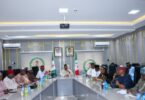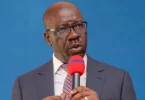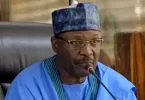Speaker of the House of Representatives, Hon Tajudeen Abbas, has called for adequate action to address the underrepresentation of women in Nigeria’s governance system
The Speaker made the call in his goodwill message at a one-day High-level National Summit on Constitutional Inclusion of Women in Governance on Thursday in Abuja.
The Summit which was hashtag #WomenCanLead, was organised by the African Centre Leadership, Strategy, and Development(Centre LSD) with support from the Foreign, Commonwealth, and Development Office(FCDO) through Policy and Legal Advocacy Centre(PLAC)
The Speaker lamented that despite the demographic advantage, it is disheartening to note that women’s representation in governance has not kept pace
with their numbers.
He noted that over the years, Nigeria has witnessed a persistent underrepresentation of women in decision-making positions across various sectors.
“This disparity is not merely a statistic; it reflects systemic barriers that hinder women’s participation and limit their ability to influence policies that affect their lives and communities.”
“In many countries around the world, we have witnessed how increased representation of women in leadership roles has led to
transformative changes within societies.
“These changes often manifest in improved health care systems, enhanced educational opportunities for children, and more robust economic policies that address the needs of diverse populations. It is imperative that we learn from these examples as we strive to create an inclusive political environment here in Nigeria.”
He said this national summit provides a crucial platform for harmonizing efforts among all stakeholders-government officials, civil society organizations, private sector representatives, and international partners to forge a united front in advocating for women’s constitutional inclusion.
“Our discussions today should focus on developing strategies for enhancing women’s representation in governance and ensuring that their voices are heard at all levels.”
“While it is imperative for the summit to highlight the importance of women’s inclusion in governance, it is equally important to identify the inhibitors of women’s inclusion and address them decisively through appropriate administrative, institutional and legislative reforms.”
“Limiting factors that have been identified include gender inequalities, limited access to education and healthcare, lack of enforcement of relevant national and state laws, and cultural and religious norms that continue to entrench gender stereotypes in the polity.”
He disclosed that the 10th National Assembly is also very much concerned about the low level of women’s representation in governance. In examining the electoral outcomes from the 2015 and 20,19 elections, it is evident that women’s political representation remains disproportionately low compared to their population size.
“In the 2015 and 2019 elections, a total of 2,970 candidates were on the electoral ballot, which accounted for only 11.36 percent of elected candidates being women. This statistic underscores a significant gender disparity in political representation,” he added.
Similarly, the Founding Executive Director of the Centre for Leadership Strategy and Development, Otive Igbuzor called on the 10th National Assembly to pass the five gender bills rejected by the previous assembly.
He noted this move aims to increase women’s representation in Nigeria’s government, which currently stands at a mere 4%.
Igbuzor also highlighted the global trend of increasing women’s participation in politics, citing a rise from 11% in 1994 to 25% in 2023.
He disclosed that African countries like Rwanda, South Africa, and Mozambique have made significant strides, with women holding over 40% of parliamentary seats.
“Research has shown that women’s inclusion in government leads to better outcomes in critical areas like education, health, water, and children’s welfare.”
Igbuzor emphasized that boosting women’s representation is not only a political imperative but also an economic one, driving development and progress.
ALSO READ THESE TOP STORIES FROM TheWitness







